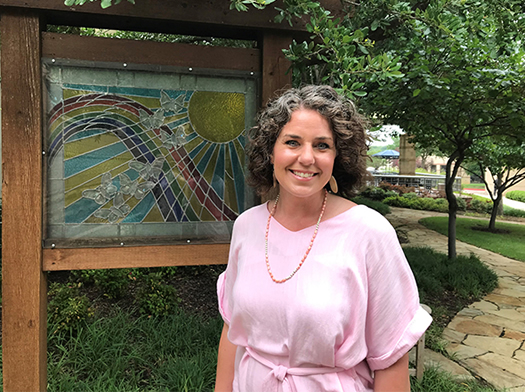DENTON, Texas — It’s lunchtime, but caregivers at this Texas Health hospital aren’t headed to the café. They’re in an auditorium for Schwartz Rounds ® — an educational group discussion on the social and emotional issues they face in caring for patients and families. The sessions are designed as an open forum for caregivers to share their feelings and offer and receive support from each other.

“As caregivers, we go through the emotions along with our patients and don’t always get to express our feelings in real time,” said Kasey McCollum, M. Div., B.C.C., chaplain at Texas Health Presbyterian Hospital Denton. “Schwartz is safe place where our staff can openly talk about their daily stresses and they can listen and learn from others who are going through similar situations.”
Support system
The mood is relaxed as the audience takes their seats. They’re facing a panel of caregivers who take turns discussing their experiences related to a specific topic, situation or case. The panel comes empty handed — leaving all clinical notebooks at the door because all cases are anonymous and confidential.
Tiffani Kelley has been both a panelist and audience member at these events.
“It’s like a mini therapy session,” said Kelley, O.T.R., an occupational therapist at Texas Health Presbyterian Hospital Dallas. “You can share the successes and challenges you face every day. You’re not alone and it’s nice to have that encouragement.”
A recent topic about when caregivers and families disagree drew a large crowd. Audience members offered suggestions for handling tricky situations that often leave caregivers between a rock and a hard place.
“These can be heavy topics we’re not used to talking about,” said McCollum, recalling one panelist who talked about a situation that occurred 40 years ago.
“People in the audience will suggest programs that some of us have never heard about,” Kelley said. “I’m grateful to have these extra resources in my back pocket to use in the future.”
Schwartz legacy
Boston health care attorney Kenneth Schwartz founded The Schwartz Center for Compassionate Healthcare in 1995, just days before his death. While battling lung cancer, he outlined a plan to create an organization that would promote compassion in medicine and encourage caregiver-patient relationships.
Schwartz Rounds® take place in more than 400 health care organizations across the country. Texas Health Dallas started the program in 2015 and Texas Health Denton followed in 2017. It’s offered once every two months to all employees.
“In the beginning, we opened the event to a select group of 50 participants. Now we average more than 100 participants at Texas Health Dallas,” said Ellen Vuong, B.S.N., R.N., clinical educator with Texas Health Resources University. Vuong says several other Texas Health hospitals have expressed interest in the program.
A different perspective
Schwartz allows staff members to explore and understand different perspectives in a nonjudgmental environment. Participants said it helps decrease feelings of stress and isolation, so they return to work with a renewed compassion and insight to their patients.
“What we found is that when caregivers are more aware of their own feelings and experiences, they’re able to connect more with their patients,” McCollum said. “It’s also improved communication between colleagues throughout the hospital.”
“Schwartz gives us a new understanding for our patients,” Kelley said. “As caregivers we have to remember that we’re not the ones in pain or stuck in a hospital bed.”
Related News
About Texas Health Resources
Texas Health Resources is a faith-based, nonprofit health system that cares for more patients in North Texas than any other provider. With a service area that consists of 16 counties and more than 8 million people, the system is committed to providing quality, coordinated care through its Texas Health Physicians Group and 29 hospital locations under the banners of Texas Health Presbyterian, Texas Health Arlington Memorial, Texas Health Harris Methodist and Texas Health Huguley. Texas Health access points and services, ranging from acute-care hospitals and trauma centers to outpatient facilities and home health and preventive services, provide the full continuum of care for all stages of life. The system has more than 4,400 licensed hospital beds, 6,400 physicians with active staff privileges and nearly 29,000 employees. For more information about Texas Health, call 1-877-THR-WELL, or visit www.TexasHealth.org.
